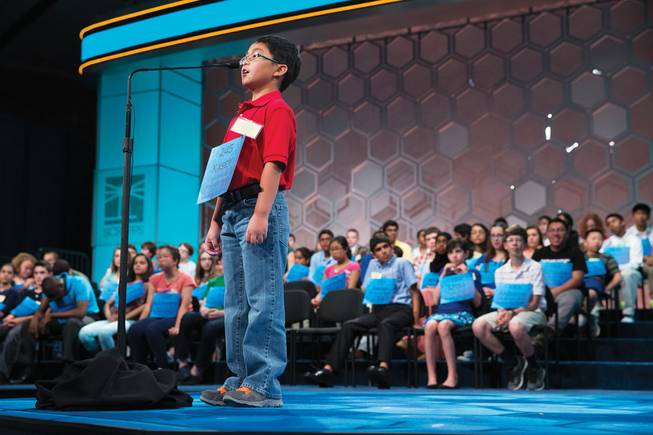
Evan Vucci / AP Photo
Kasey Torres of San Angelo, Texas spells the word “phaeton” correctly during the preliminary round of the National Spelling Bee, Wednesday, May 28, 2014, in Oxon Hill, Md.
Sunday, March 8, 2015 | 3 a.m.
↪
They never fail, year after year, to amaze us — the sixth-, seventh- and eighth-graders who stand before the nation, and nervously, tentatively and then with great, if feigned, authority, spell words unfathomable to most of us.
Eudaemonic. Staphylococci. Feuilleton. Esquamulose. Stichomythia. Two of these words are so obscure, my spell checker challenges them. But they’re spelled correctly. And there are kids out there who live to spell them.
Nevada’s 36 best middle-school spellers will gather at 10 a.m. March 14 at Bishop Gorman High School to determine who will represent the state at the National Spelling Bee in May in Washington, D.C.
Can you spell competitiveness? Theirs is a journey that began in classrooms throughout the state, where they prevailed over classmates to become their schools’ spelling champs, then faced another layer of competition to further whittle the competitors.
In Clark County, five youngsters qualified for the state finals — two from the School District, one representing Catholic schools, another representing other private schools, and one representing home-schooled students.
The students have no idea what words they’ll be asked to spell. Many words will be taken from study guides offered by the sponsor of the National Spelling Bee, the media company E.W. Scripps. But in the final rounds of the state and national contest, the students will hear words they’ve possibly never encountered — words sent to Scripps from a national network of contributors whose names are top secret.
During the bee, spellers can ask for a word’s etymology and definition, and for the word to be used in a sentence. Students learn word origins, because their genesis can hint at their spelling. What sounds like a short i, for instance, may be a y if the word has Greek roots, such as synergy and Olympian. (Will this help me spell philhellenism? Probably not.)
“They’ve learned the idiosyncrasies of old languages to help them solve these puzzles,” said Melinda Brown, who runs the Nevada Spelling Bee, of which the Greenspun Media Group, publisher of The Sunday, is the primary sponsor. “Can I do that? No way. I remember, ‘i before e except after c.’ ”
With the pressure of competition, it still can be easy for a student who has studied spelling three or four hours a day to misspell a relatively simple word. But in the long run, the students are well on their way to successful lives because of their mastery of words, vocabulary and reading.
“Reading is the key to everything,” Brown said. “They all enjoy reading. They’re all good writers. These skills will lead them to all kinds of successes, whether the kid becomes a computer programmer or a mathematician. Understanding language is key to success in anything you do.”
A case in point is Dakota Jones, the first Nevadan to make it to the final round of the National Spelling Bee. Jones was 14 at the time and ended his run in the top six. Today he’s 18 and plans to attend BYU after graduating from Northwest Career and Technical Academy.
Jones excels in math and chemistry, is a National Merit Scholar finalist and is part of a school team invited to participate in the National Science Bowl in May. He plays chess, too, but Jones’ favorite pastime is baking bread for the lunches he packs for school and making cookies and other desserts for his family.
Once, he messed up a recipe and added an extra half cup of flour. To save the batch, he recalculated the amounts needed for the other ingredients to preserve the recipe. All was saved.
That’s spelled i-m-p-r-o-v-i-s-a-t-i-o-n.

Join the Discussion:
Check this out for a full explanation of our conversion to the LiveFyre commenting system and instructions on how to sign up for an account.
Full comments policy